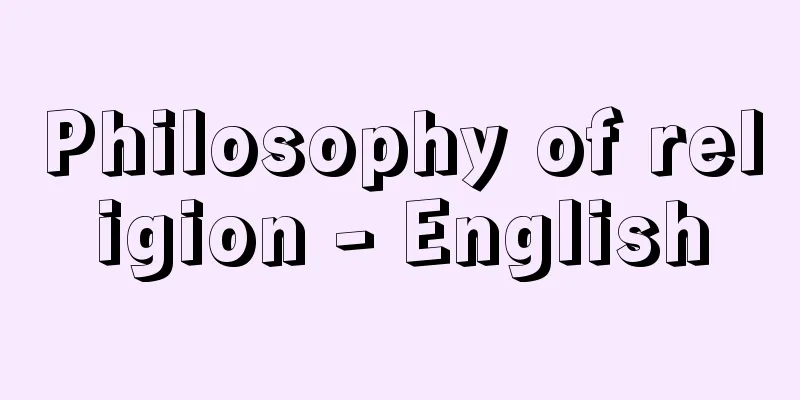Philosophy of religion - English

|
It is an academic field that uses philosophical methods to investigate the essence and meaning of religion and to provide a philosophical basis for the truth of religion. It is different from religious studies, which studies religious phenomena that have appeared in history and society from the standpoint of empirical science, and theology and teaching, which examine the doctrines and scriptures of a particular religion within that religion. Philosophy, which began in ancient Greece, was generally an attempt to explain the phenomenal world that humans can experience from metaphysical ideas that transcend experience. If religion opens a path to another world or God that transcends human sensory and intellectual experience, then in ancient philosophy, including that of Plato and Aristotle, philosophy itself could be said to be a kind of religious philosophy. Moreover, the medieval patristic and scholastic philosophy of Augustine, Thomas Aquinas, and others, which played a role in forming Christian theology, was literally a philosophy that placed religious philosophy at its core. However, with the advent of the modern era and the rise of rationalist philosophy, which placed complete trust in human reason, the tendency to strip philosophy of its religious nature intensified, and the very existence of religious philosophy came under scrutiny once again. Thus, it was in the work of Kant and the German idealist movement that religious philosophy was consciously established as a branch of philosophy in the strict sense. Kant recognized in human reason the power to go beyond intellectual and theoretical knowledge, and based religion on the practical reason of the good will operating in the field of morality. Hegel positioned the philosophy of religion in the highest division of the philosophy of spirit, which is distinct from logic and natural philosophy, and spoke of a pantheistic philosophy of religion, in which the entire system of philosophy that describes the world-dominating development of the absolute spirit is completed as an absolute religion. Today, while religious philosophies such as those of James and Jaspers, which seek to establish the truth of religion in general from a philosophical standpoint, are preached, religious philosophies that accept Christian faith in revelation and develop philosophical thinking that is in line with this are influential. Examples of such religious philosophers include Schleiermacher, who seeks the essence of religion in human feelings of absolute dependence; Kierkegaard, who uncovers the fundamental anxiety and despair of human beings and seeks salvation in a paradoxical God; Troeltsch, who overcomes the relativity of history with the absoluteness of God; Teilhard de Chardin, who understands the progress of science by linking it to eschatology; and Tillich, who returns to the ground of existence through the ultimate concerns that underlie various cultures. The religious philosophy of the Jewish philosopher Buber, based on the principle of dialogue, has also been influential. [Keiichi Kashiwabara] "Hatano Seiichi, Philosophy of Religion (1935, Iwanami Shoten)" ▽ "Fujita Tomio, Philosophy of Religion (1966, Daimeido)" ▽ "J. Hick, Philosophy of Religion, translated by Mase Hiroyuki (1968, Baifukan)" ▽ "P. Tillich, Introduction to the Philosophy of Religion, translated by Yagyu Nozomu (1971, Arachi Publishing)" [Reference items] | |Source: Shogakukan Encyclopedia Nipponica About Encyclopedia Nipponica Information | Legend |
|
宗教の本質や意義を哲学の方法で究明し、宗教の真理性を哲学的に基礎づける学問。歴史や社会に現れた諸宗教現象を実証科学の立場で研究する宗教学や、特定の宗教内部でその宗教の教義や教典を検討する神学・教学などとは異なる。 古代ギリシアに始まった哲学は、一般に、人間の経験しうる現象世界を、経験を超えた形而上(けいじじょう)学的理念から説明しようとする試みであった。宗教が人間の感覚的、悟性的な経験を超え出た彼岸や神への通路を開くものとすれば、プラトンやアリストテレスをはじめとする古代哲学においては、哲学そのものが一種の宗教哲学であったといえる。また、キリスト教の神学を形成するにあずかったアウグスティヌス、トマス・アクィナスらの中世の教父哲学やスコラ哲学は、文字どおり宗教哲学を中核に据えた哲学であった。 しかし、近世に至って人間の理性に十全の信頼を置く合理主義の哲学が登場すると、哲学における宗教性の剥奪(はくだつ)の傾向が強まり、宗教哲学は改めてその存立が問われることになる。したがって、厳密な意味で宗教哲学が自覚的に哲学の一分野として確立されるに至ったのは、カントとそれ以降のドイツ観念論の哲学においてであった。 カントは、人間の理性に知的・理論的認識を超えた働きをも認め、道徳の場で働く善意志の実践理性に宗教の根拠を置く。ヘーゲルは、論理学や自然哲学から区別される精神哲学のなかの最高部門に宗教哲学を位置づけつつ、絶対精神の世界支配的展開を叙述する哲学の全体系は絶対的宗教として完成するという汎神論(はんしんろん)的宗教哲学を語った。 今日では、あくまでも哲学の立場から宗教一般の真理性を基礎づけようとするジェームズやヤスパースのような宗教哲学が説かれる一方で、キリスト教の啓示信仰を容認しながらこれにかなった哲学的思考を展開する宗教哲学が有力である。そのような宗教哲学者としては、人間の絶対的依存感情に宗教の本質を求めるシュライエルマハー、人間の根源的な不安と絶望を暴いて逆説の神に救いを求めるキルケゴール、歴史の相対性を神の絶対性で克服するトレルチ、科学の進展を終末論と結び付けて理解するテイヤール・ド・シャルダン、諸文化の底を流れる究極的関心を介して存在の根拠へ帰るティリヒなどをあげることができる。ユダヤ教徒のブーバーの対話原理に基づく宗教哲学も影響力が大きい。 [柏原啓一] 『波多野精一著『宗教哲学』(1935・岩波書店)』▽『藤田富雄著『宗教哲学』(1966・大明堂)』▽『J・ヒック著、間瀬啓允訳『宗教の哲学』(1968・培風館)』▽『P・ティリッヒ著、柳生望訳『宗教哲学入門』(1971・荒地出版社)』 [参照項目] | |出典 小学館 日本大百科全書(ニッポニカ)日本大百科全書(ニッポニカ)について 情報 | 凡例 |
>>: Religious Organizations Act
Recommend
Ludwig Bieberbach
1886‐1980 German mathematician. Born in Godderau, ...
Kumtura Caves
A group of Buddhist caves excavated at the foot of...
Creel
Also written as "fish basket." A contain...
Nephrops thomsoni (English spelling) Nephropsthomsoni
… [Takeda Masatomo]. … *Some of the terminology t...
Sanukite
A dense black andesite found in the central Kii Pe...
North China Development Company
...Companies engaged in colonization and developm...
Energy balance
→Energy balance Source: Asakura Publishing Nutriti...
Granados - Granados (English spelling) Enrique Granados y Campiña
Spanish composer and pianist. Along with Albéniz,...
Animals - Animals (English)
When organisms are roughly divided into three kin...
Pyatakov, GL (English spelling) PyatakovGL
...In September 1936, when Yezhov, a bureaucrat i...
Cladophora sauteri (English spelling) Cladophorasauteri
…[Mitsuo Chihara]. . . *Some of the terminology t...
Inca Garcilaso de la Vega - Inca Garcilaso de la Vega
…In chronological chronicles, a distinction is al...
Utsunomiya [city] - Utsunomiya
A city in the center of Tochigi Prefecture. Establ...
Tozaburo Ito - Tozaburo Ito
...Lyrics by Sakurada Jisuke II. Music by Kineya ...
Asuka Imperial Court
...These are the Toyoura, Ogasawara, Okamoto, Tan...









